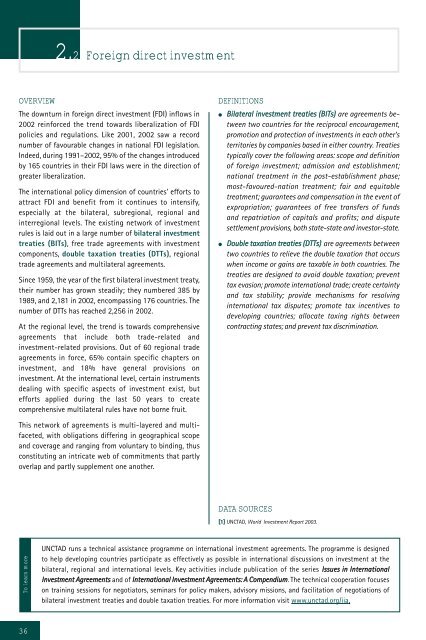Development and Globalization: - Unctad
Development and Globalization: - Unctad
Development and Globalization: - Unctad
Create successful ePaper yourself
Turn your PDF publications into a flip-book with our unique Google optimized e-Paper software.
36<br />
2.2 Foreign direct investment<br />
OVERVIEW DEFINITIONS<br />
The downturn in foreign direct investment (FDI) inflows in<br />
2002 reinforced the trend towards liberalization of FDI<br />
policies <strong>and</strong> regulations. Like 2001, 2002 saw a record<br />
number of favourable changes in national FDI legislation.<br />
Indeed, during 1991–2002, 95% of the changes introduced<br />
by 165 countries in their FDI laws were in the direction of<br />
greater liberalization.<br />
The international policy dimension of countries’ efforts to<br />
attract FDI <strong>and</strong> benefit from it continues to intensify,<br />
especially at the bilateral, subregional, regional <strong>and</strong><br />
interregional levels. The existing network of investment<br />
rules is laid out in a large number of bilateral investment<br />
treaties (BITs), free trade agreements with investment<br />
components, double taxation treaties (DTTs), regional<br />
trade agreements <strong>and</strong> multilateral agreements.<br />
Since 1959, the year of the first bilateral investment treaty,<br />
their number has grown steadily; they numbered 385 by<br />
1989, <strong>and</strong> 2,181 in 2002, encompassing 176 countries. The<br />
number of DTTs has reached 2,256 in 2002.<br />
At the regional level, the trend is towards comprehensive<br />
agreements that include both trade-related <strong>and</strong><br />
investment-related provisions. Out of 60 regional trade<br />
agreements in force, 65% contain specific chapters on<br />
investment, <strong>and</strong> 18% have general provisions on<br />
investment. At the international level, certain instruments<br />
dealing with specific aspects of investment exist, but<br />
efforts applied during the last 50 years to create<br />
comprehensive multilateral rules have not borne fruit.<br />
This network of agreements is multi-layered <strong>and</strong> multifaceted,<br />
with obligations differing in geographical scope<br />
<strong>and</strong> coverage <strong>and</strong> ranging from voluntary to binding, thus<br />
constituting an intricate web of commitments that partly<br />
overlap <strong>and</strong> partly supplement one another.<br />
To learn more<br />
● Bilateral investment treaties (BITs) are agreements between<br />
two countries for the reciprocal encouragement,<br />
promotion <strong>and</strong> protection of investments in each other’s<br />
territories by companies based in either country. Treaties<br />
typically cover the following areas: scope <strong>and</strong> definition<br />
of foreign investment; admission <strong>and</strong> establishment;<br />
national treatment in the post-establishment phase;<br />
most-favoured-nation treatment; fair <strong>and</strong> equitable<br />
treatment; guarantees <strong>and</strong> compensation in the event of<br />
expropriation; guarantees of free transfers of funds<br />
<strong>and</strong> repatriation of capitals <strong>and</strong> profits; <strong>and</strong> dispute<br />
settlement provisions, both state-state <strong>and</strong> investor-state.<br />
● Double taxation treaties (DTTs) are agreements between<br />
two countries to relieve the double taxation that occurs<br />
when income or gains are taxable in both countries. The<br />
treaties are designed to avoid double taxation; prevent<br />
tax evasion; promote international trade; create certainty<br />
<strong>and</strong> tax stability; provide mechanisms for resolving<br />
international tax disputes; promote tax incentives to<br />
developing countries; allocate taxing rights between<br />
contracting states; <strong>and</strong> prevent tax discrimination.<br />
DATA SOURCES<br />
[1] UNCTAD, World Investment Report 2003.59.<br />
UNCTAD runs a technical assistance programme on international investment agreements. The programme is designed<br />
to help developing countries participate as effectively as possible in international discussions on investment at the<br />
bilateral, regional <strong>and</strong> international levels. Key activities include publication of the series Issues in International<br />
Investment Agreements <strong>and</strong> of International Investment Agreements: A Compendium. The technical cooperation focuses<br />
on training sessions for negotiators, seminars for policy makers, advisory missions, <strong>and</strong> facilitation of negotiations of<br />
bilateral investment treaties <strong>and</strong> double taxation treaties. For more information visit www.unctad.org/iia.

















